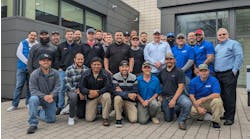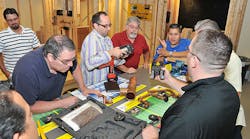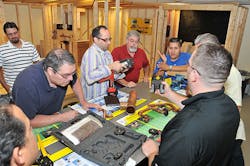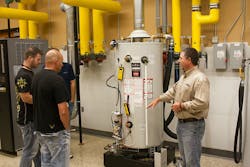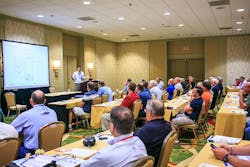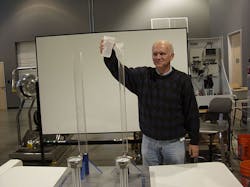Latest from Training Opportunities
Sponsored
Education in the trades is evolving, giving contractors more options to advance their skill sets
Training is more important than ever in the plumbing, hydronics and heating industries. Continuing education helps inform contractors of upcoming changes, innovations, code issues and industry standards. Technology is advancing and contractors need to know how to install and service all products.
New technologies are being introduced. As consumers become more aware of these options, they expect their contractors to be experts when coming into their home or business. Also, new codes are being implemented that require contractors to be the source of knowledge.
“The means in which contractors are expected to conduct business are constantly evolving, so these professionals must continue to hone both their general business and technical skills,” says Chad Sanborn, product marketing manager, Bradford White Water Heaters, Ambler, Pennsylvania.
Also, many states have recognized the need for continuing education among the active trades. These states and other organizations require the accumulation of approved Continuing Education Units (CEUs) in order to allow licensure and/or re-certification.
Manpower shortage
Accelerating the need for training is a manpower shortage in the trades as the old guard retires.
In the last few years, trade unions have had fewer new incoming members, whereas traditionally they have a new class every year. Unfortunately fewer young people want to enter the construction trades today.
One of the goals of our training program is to encourage young trades people to understand that working with piping systems requires technical skill, thought and experience,”—says Domenic DeCaria
“We need to elevate the trades to move beyond old stereotypes,” says Domenic DeCaria, market segment manager, Lubrizol Advanced Materials Inc., Cleveland. “One of the goals of our training program is to encourage young trades people to understand that working with piping systems requires technical skill, thought and experience.”
While critical technical skills need to be learned, relearned and refreshed, customer relation skills are important as customer expectations evolve and competition grows.
“Many contractors carry the technical skills; however, some lack the basic business skills that are needed to keep repeat business and continue to grow,” says Sanborn. “Professional trade organizations that offer continuing education are increasing their general business curriculum to address this need.”
While much of today’s training focuses on new products and new technology, there needs to be more focus on teaching the basics of processes such as how to conduct a heat loss analysis, according to John Barba, contractor training and trade program manager, Taco Inc., Cranston, Rhode Island.
“No one’s teaching that anymore and I blame software. Sure, the software will do heating and cooling loads for you, but it’s really nothing more than a fancy calculator," says Barba. "The software does the math, but it doesn’t think or make decisions. It’s so much better for installers to learn and be able to explain why things are done in specific ways.”
With that focus in mind, Bell & Gossett Little Red Schoolhouse, Morton Grove, Illinois, offers training seminars that focus on hydronic system design.
“It is important that contractors understand the interactions among all the components and the types of technology that makes these systems work more efficiently,” says Larry Konopacz, training and education manager. “Variable speed drives are critical to these systems and tend to be an area that needs to be addressed in continuing education.”
Goulds Water Technology Factory School, Seneca Falls, New York, offers four classes that focus on water systems, variable frequency drives, wastewater pumping and commercial pump products.
“We redesigned our lab four years ago to be quickly interchangeable,” says Thomas Stephan, training and education manager. “This means that one day we could be teaching about variable speed drives with hands-on learning activities and later in the week teach a course about water pumping.”
Latest training methods
John Zink, vice president of education and programs, PHCC Educational Foundation, Falls Church, Virginia, says the contracting industry has traditionally relied on articles, classroom instruction, in-person seminars and demonstrations at supply houses.
“Use of online training tools, webinars and blended learning offerings are more common now, but in-person training continues to provide a powerful learning experience for attendees,” says Zink. “Blending online and in-person training can provide the best fit for some training.”
One key advantage of the face-to-face trade school setting is that students get the opportunity to work side-by-side with skilled instructors, as well as other skilled labor coworkers, according to Mark Eatherton, executive director, Radiant Professionals Alliance, Mokena, Illinois. In this environment, they get the opportunity to learn from other people’s mistakes, and avoid making those same mistakes themselves.
Face-to-face training has been the industry standard for years, but there has been a big move to online-based training. Videos and webinars, both live and recorded, are most often used.
For contractors, the methods are still evolving to meet the needs of the job, such as being mobile-ready, since this information is often needed at or between jobs instead of at a desktop computer in the office,"—says Jim Swetye
“For contractors, the methods are still evolving to meet the needs of the job, such as being mobile-ready, since this information is often needed at or between jobs instead of at a desktop computer in the office,” says Jim Swetye, technical training manager, Grundfos USA, Olathe, Kansas.
Taco Inc. provides interactive e-learning programs via its FloPro University. The programs are broken into small chunks, so contractors can take the class at a computer.
“They can start and stop the class at their convenience and take the program as many times as needed,” Barba notes.
Customizing courses
Customizing courses is another trend. PHCC Educational Foundation offers apprentice training textbooks (paper or e-books) that can be used by schools nationwide. An online e-learning option is available based on those textbooks.
“One issue is that each state has its own licensing and continuing education rules, so in some cases we have worked with the contractors and state licensing boards to customize portions of our training,” says Zink. “Those tweaks allow them to count towards apprenticeship or CEU requirements.”
A.O. Smith Corp., Milwaukee, Wisconsin, uses new technologies to bring training to more people at lower costs. One of those developments is A.O. Smith University, which has nearly 100 video training courses. Another is the Digital Classroom, which provides training live over the Internet.
“For our commercial water heater course, students take the classroom portion online,” says Henry James, technical training manager, A.O. Smith. “When they come to our training facility, the classroom parts have already been covered, so we spend 100 percent of the training time in a working lab with live equipment.
We also have been using two-way video for tankless training,” explains James. “Instructors cover the testing and repair of one part and then watch the guys on the other end perform the repair. This way, our instructors can review how well the technicians are doing the work. The only additional equipment the student needs is a smart phone.”
Viega LLC, Wichita, Kansas, utilizes a hands-on space that has live power, water, boilers and water heaters that allows students to install and operate plumbing, piping and radiant heating systems.
“This allows customers to get first-hand installation experience with all Viega products before installing them on their jobs in the field,” says Jason McKinnon, director of technical services.
Lubrizol Advanced Materials works with local unions to help them develop their own training programs using the best practices and best training tools available.
“Going through the code books, sharing design manuals and using hands-on training is about as ‘real world’ as it gets,” states DeCaria. “Hardly anyone carries their code book and many contractors do not understand how to talk to inspectors, engineers or plan check engineers.”
Online everywhere
Contractors that are computer savvy have unlimited options to continuing education. Not only can they view recordings and attend live webinars but there are hundreds of online training platforms for contractors to learn more about new products and systems.
“We surveyed our contractor base and determined that online is a good way to go,” Eatherton says. “Most of our contractor members are shops of fewer than five people. These folks can’t afford to take time off from their jobs to attend classes, nor can they absorb the travel expenses unless it is being picked up by a major manufacturer, which has been the typical method of providing training.”
Online training can play a valuable but not exclusive role in the learning process for contracting professionals, according to Swetye.
“With technical products such as pumps, online training can be a great place to start the path to learning,” says Swetye. “With some topics — especially those that require deeper levels of performance or decision making — a blended approach using a combination of online, webinar and face-to-face classes may be best.”
The wide variety of in-person and online training options available for contractors today can actually pose a problem if one is not selective, experts agree.
“There’s an endless variety of training options available, some for a fee and others that are sponsored,” Zink says. “An online search can provide even more options for training when you have time to explore.
“The tricky part is making sure that the quality of the training is sound,” explains Zink. “YouTube is filled with free do-it-yourself tutorials, but you wouldn’t rely on those to train your technicians. You can expect sponsored training to come with a marketing message. You have to decide if that training is what you need to learn or just what the sponsor wants you to know.”

